- Home
- Roger Smith
Mixed Blood ct-1 Page 2
Mixed Blood ct-1 Read online
Page 2
Benny Mongrel, squatting on his haunches, took Rizla papers and a bag of Dinglers cherry tobacco from his uniform pocket and rolled a cigarette, his fingers deft and practiced. His eyes hadn’t moved from the American’s house since the two men had crossed the deck and disappeared inside. He’d seen nothing more. All he’d heard was the single gunshot.
Bessie had reared up at the sound of the shot and started to whine softly. Benny Mongrel had put a hand on her head to calm her. “Shhhhhh, Bessie. Still.”
The old dog had keened once more, then collapsed onto the concrete with a sigh and lay there with one eye open.
Benny Mongrel had sat and watched, waiting. Waiting to see the gangsters come out of the house and drive off into the night in that red BMW. But there was no sign of the men. Or the American and his family.
The guy who had called him sir.
Benny Mongrel had been called many things. He had been called bastard, bushman, rubbish, and, for many years, Prisoner 1989657. White men in suits had called him a menace to society. Brown men bleeding from his knife had called him brother as they begged for mercy. He had none to show them. Cape Flats gutter curses had been spat at him since he was ripped from the womb of a woman he never knew. But nobody had ever called him sir.
Not until the American.
Benny Mongrel and Bessie were walking the front of the site one evening, the old dog dragging her back legs, when the little white kid had come running up to them. He only had eyes for Bessie and reached out to pet her. Benny Mongrel wasn’t sure how Bessie would react and he pulled back on her chain, but she wagged her tail and stood there docile as you please, the kid stroking her matted fur.
Then the white man came over. He’d been unlocking the street door to the neighboring house, a high-walled fortress like all the others in the street, when the kid scooted over.
“Hey, Matt. Take it easy.”
The guy spoke like the people on those TV shows the other prisoners had watched in Pollsmoor Prison. American. He looked a bit like somebody from those shows too, biggish with a clean face and some gray in his dark hair.
Even though it was nearly 7:00 p.m., the sun was still high, so when the kid looked up at Benny Mongrel for the first time, he could see his face clearly. And that was when the kid let go of Bessie and jumped back, like he had seen about the worst thing imaginable. He stood and stared up at Benny Mongrel, unable to tear his eyes away. He opened his mouth to scream, but all he could find was a whimper.
The big guy scooped the kid up and held him, face into his shoulder. Then he looked Benny Mongrel straight in his good eye. “I’m sorry, sir. Excuse my son.”
Benny Mongrel said nothing. Just stood there looking at the white guy who never reacted, never even blinked as he took in the horror that was the left side of his face. Benny Mongrel had lived inside this mess of misshapen bones and keloid scar tissue for more than twenty years. He didn’t care. His face had served him well. It had been an asset in the life he had lived.
Most people reacted the way the kid did when they saw his face, but the American guy stuck out his hand. “My name’s Jack. I live next door.”
Benny Mongrel had never shaken hands with a white man, and he wasn’t about to start now. He hauled at Bessie’s chain, whistled sharply to get her moving, and headed back onto the site.
But something about the American had got his interest. He would watch them from the top floor of the building site, the big guy and his small blonde wife and the kid. In their house or driving away in their fancy Jeep.
Benny Mongrel finished rolling his cigarette. He lit it, his ruined face visible in the flaring match. He sucked the warm smoke deep into his lungs, and as he exhaled he heard the siren.
The ambulance screamed up to the house and two medics got out. The door in the garden wall buzzed open, and Benny Mongrel watched as they hurried inside. The medics carried the white woman out on a stretcher. They put her in the back of the ambulance and drove away. The light flashed, but the siren was mute.
Benny Mongrel waited. Puzzled. Where were the gangsters? And where were the cops?
Then the garage door rolled up and the big guy reversed out in the Jeep. The door rolled shut. As the Jeep passed beneath him, Benny could see the child strapped into the car seat in the back.
Benny unfolded himself from his squatting position and walked to the edge of the balcony. He looked down at the red BMW, then back at the house next door. Bessie appeared beside him and licked his hand.
He patted her head and spoke in a whisper. “I think they seen their mothers, Bessie.”
Inspector Rudi Barnard, known on the Flats as Gatsby, drove his white Toyota through the rape and murder capital of the world, the dark flip side of the Cape Town tourist postcard. The night was full of the usual music of the Cape Flats: sirens, snatches of screams and laughter, gunshots, andpumping hip-hop. The Flats were where anybody who wasn’t white had got dumped back in the days of apartheid, far from the privileged suburbs slung like jewels around Table Mountain. A desolate, bleak sheet of land persecuted by wind and dust.
Even when it wasn’t hot, Barnard sweated, but on this January night the water dripped from his jowls, gluing the shirt to his sumo-sized gut. All the windows of the Toyota were open as he drove, but the air lay heavy as a dead whore across the Cape Flats.
Rudi Barnard loved Jesus Christ, gatsbys, and killing people. And out here on the Flats he could feel that love the most.
The bumper-sticker simplicity of reborn Christianity suited Barnard well. He would get up each morning and pray. Then he would part his air bag-sized butt cheeks and smear Preparation H on his hemorrhoids, clothe himself in jeans and check shirts from the Big ’n Tall shop, strap on his Z88 9 mm service pistol, and go forth and dispense frontier justice in the name of the Lord Jesus Christ.
Unbidden, an image of Carmen Fortune’s body came to him, her breasts and thighs barely covered by the short nightgown. He pushed it away. Barnard couldn’t remember when last he’d had sex with a woman. Sometime before his bitch of a wife had finally left him. He didn’t miss her or the screwing. He had always found the process disgusting. When the urge grew too great for prayer to subdue, he spent a few guiltstricken minutes in communion with his hand and a Hustler magazine.
To distract himself from that image of the half-breed’s brown thighs, he grabbed the mike of the car radio, barking out an APB on Rikki Fortune’s red BMW. Saying it might be in the Sea Point area. He wasn’t desperate for the five grand Rikki owed him. His web of vice and corruption generated a constant source of income that met his modest needs. But he couldn’t let a little cunt like Rikki get away with anything.
Fear was his God-fueled power. Any sign of weakness and it would be his body found dumped in an open strip of veld.
The law of the jungle.
Burn paced the waiting room of a private hospital in a leafy suburb of Cape Town, his son sleeping on a chair, his young wife and her detached placenta somewhere behind swinging doors, and two dead bodies going cold in his dining room.
When they’d fled the United States three months before, he’d had little time to decide on a destination. Not Asia, because they would be too visible and he had wanted to be sure of medical care for his pregnant wife. Not Europe, too much of a colony of the States. It would be harder to disappear. It was a toss-up between Sydney or Cape Town. Australia, despite its huge landmass, had a tiny population, and Burn had felt claustrophobic just thinking about it. South Africa sounded good, with a Western infrastructure if you could afford it, but chaotic enough for a man to fall through the cracks.
But that chaos had reached out and grabbed hold of his life by the throat.
“Sir?” A pale-skinned young nurse in a crisp uniform appeared before him. “You can see your wife now.”
Burn stood and reached down for Matt. The nurse shook her head. “I’m sorry, but the little boy can’t go in wit you.” She smiled. “Don’t worry, I’ll sit with him.”
Burn man
aged a smile in return. “Thank you.”
Susan was in a private ward that looked like a hotel room. She lay in bed, wan and beautiful. She opened her eyes when Burn came in.
He hesitated, then took her hand. She let him. “How are you feeling?”
“Everything’s okay, Jack. My baby is fine.”
He nodded. “I know.”
“I just need to stay in here for a couple of days.”
“Good. Let them take care of you.”
She took her hand back. “You go now.”
“Are you okay?”
“I just want to sleep.”
“I’ll see you tomorrow.”
She nodded, closing her eyes, already withdrawing from him as he walked away.
CHAPTER 3
It was just past 10:00 p.m. when Burn slowed the Jeep Cherokee outside his house. He was tense, expecting police cars and security patrol vehicles. There were cars, all right, more than usual, lining both sides of the road. But they were the luxury vehicles common to these streets of plenty: convertibles and SUVs.
The night, now that the wind had died, was still and hot, and he caught the tang of animal fat cooking on a wood fire. He had to fight back a sudden feeling of nausea, knowing what waited for him in his dining room.
He pressed the garage remote, and as the door rolled up he heard snatches of an overorchestrated version of a Beatles song he couldn’t place, and the trill of genteel laughter wafting across from the party at a neighboring house. He nosed the car into the garage and released the door. He sat for a minute, listening to the sound of his son sleeping on the rear seat, before he opened the car door.
Burn carried Matt into the living room and lay him down on the sofa. The sliding doors to the dining room were closed. He had shut them so the paramedics who came to attend to Susan wouldn’t see the carnage within.
Burn went into the kitchen and took heavy-duty black garbage bags from the drawer by the sink. He found a roll of duct tape and a retractable carpet knife and pulled on a pair of plastic kitchen gloves.
He checked that Matt was still sleeping and quietly opened the sliding doors. Burn had killed men in Iraq, but it had been nothing like what had happened in his home that night. Combat during Desert Storm had the surreal feel of a PlayStation game, the high-tech weaponry keeping death at a distance.
Not like this.
The tall man lay on his back, the carving knife still buried in his chest. The bullet he had taken from the short man’s gun had entered his abdomen below the ribs. He’d bled out. Burn could take some refuge in the knowledge that stabbing the man had been a reflex, a primitive impulse to protect his family.
There could be no such comfort taken from the death of the short man, who lay in his own blood, milky eyes fixed on the ceiling, the gaping wound in his throat like an accusing mouth. To call him a man was an exaggeration; he looked no older than twenty, and his smallness made Burn’s actions seem all the more brutal. Burn had disarmed him, rendered him harmless. In a normal world Burn would have called the cops and let the law enforcement machinery do what it was meant to do.
But Jack Burn no longer lived in a normal world, and the police had not been an option. So he had murdered the scrawny man. And telling himself that he’d had no choice didn’t make him feel any better.
Benny Mongrel watched the house next door.
He heard the slap of car doors and a man laughing. The party up the road was still going strong. Bessie had been on edge all night, what with that gunshot and the music and the white people laughing like horses. But mostly because of the food; that smell of meat cooking on the fire had driven her nearly crazy. She sat next to him, shifting on her aching hips, her snout still searching the air for the smell of lamb on the spit.
He stroked her coarse fur. “Don’t worry, old girl,” he whispered. “There’ll be pickings for us in the bins tomorrow.”
Benny Mongrel was on edge, too. He pondered, over and over again, the significance of the gangsters disappearing into that house.
The Americans.
When Benny Mongrel was eighteen, a member of the Americans gang called Bowtie April had chopped him with an ax, taking his left eye and caving his face in from brow to chin. He had killed Bowtie, torn his throat out with his bare hands, before he allowed the cops to drag him off to the hospital. The doctors hadn’t cared a fuck about another gangster punk. On the Cape Flats reconstructive surgery wasn’t on the menu. They had stitched him up and sent him to prison.
He was a blood Mongrel. His name and the tattoos that scarred his body were testament to that. So when he went to prison for the first time, he knew which of the number gangs he was destined to join. The prison number gangs: the 26s, the 27s, and the 28s. They rule the prisons. Anyone stupid enough to resist the law of the number ends up dead.
Or worse.
The Americans are always 26s. The Mongrels are always 28s. No one asks why. It is just so. And they hate each other. So those men who had seen their mothers tonight would get no sympathy from Benny Mongrel.
He watched as the garage door rolled up again. Nearly midnight. The Jeep reversed out and the doors closed. The guy and his son passed beneath him again as they drove away.
“Ja what, they got a mess to clean up, Bessie.”
Barnard was still eating his gatsby as he drove through Paradise Park, ready to take care of the last of the night’s business. A half-breed tik cooker who paid Barnard protection money was selling to suburban schoolkids. Barnard didn’t give a shit about the schoolkids, but the situation was attracting heat. Other dealers were getting pissed off. Local politicians were asking questions about the tik suppliers. And the protection they got.
After the visit to Carmen Fortune, he’d hauled his fat into the Golden Spoon, home of the best gatsby in Cape Town. Which meant the whole fucken world.
As soon as the Muslim woman behind the counter had seen him, she’d shouted into the back, “Masala steak full house for the inspector.” Without him asking, she passed him a pine nut Double O from the fridge, keeping as far away from his stink as she could.
He grunted and tipped the bottle, glugging back most of the fake pineapple brew in one swallow. Then he lit a cigarette beneath the NO SMOKING sign. Let the bitch say a word.
The woman put his gatsby down on the counter without comment.
The gatsby is to Cape Town what a hot dog is to New York, and the full house was Barnard’s feast of choice: a football-sized French loaf stuffed with chunks of steak, eggs, melted cheese, and fries, all drenched in mayonnaise and industrial-strength chili.
Barnard shoved half of the gatsby into his mouth, sauce oozing down his jowls. He spoke as he chewed. “Gimme a pine nut for the car.”
The woman had handed him another bottle, and he’d left without a word or an offer of payment.
Barnard was still chewing as he approached the tik cooker’s place. He saw a patrol van pulled up outside, blue light flashing across the front of the squat house.
Fuck, what now?
When Barnard levered his massive bulk from the Toyota, the suspension lifted with a groan, as if relieved to be free of him. Two uniforms were standing beside a knot of people surrounding a dark shape lying on the road. The cops tensed at his arrival. They were afraid of him. He liked that.
“What’s going on?” He spoke around the last mouthful of food.
“Drive-by, Inspector.”
A half-breed girl no more than ten lay on the road. She was dying. A wailing woman was on her knees beside the child, people trying to pull her away.
Barnard looked on impassively. “Who were they targeting?”
The other cop pointed into the house. “There’s a gangster inside. They got him as he ran in. The kid was crossing the road.”
“The guy, he dead?”
“No. Wounded.”
Pity. Barnard walked into the house. In the front room a skinny half-breed in his twenties sat slumped on the floor, bleeding onto the worn carpet, shaking with
fear. He was shirtless, his body a scribble of gang tattoos. He had taken a bullet to the leg. Barnard knew it wasn’t life-threatening. He would have to sort this out before they hauled this punk off to the hospital and he started to talk his mouth off.
The boy looked up at Barnard. If he had been scared before, he was terrified now.
A woman in her fifties, crying, mopped the boy’s head. She kept on repeating, over and over, “Stay awake.”
“Go outside,” Barnard said, dismissing her with a flick of his pink paw. She hesitated, saw the look on his face, and decided she better do as he said. “Close the door.”
Barnard grabbed the kid by his jaw and jerked his head up. “Look at me, you bastard.” The kid looked at him. “Jerome, why the fuck you don’t listen to me? I told you not to sell to that school.”
“I didn’t. They lie.”
Barnard held up a hand. “Shut it, okay? Why you think they shooting at you? You got everybody pissed off.”
“Inspector, I’ll stop. I swear, on my mommy’s life.”
Gatsby shook his huge head. “Too late, Jerome.”
He unholstered his Z88 and shot the kid point-blank in the right eye. He had enough time to take the throw-down, a snub-nosed. 32, from his waistband and wrap the kid’s fingers around it before the door slammed open and the uniforms came in.
“He drew on me,” Barnard said, holstering his Z88.
The uniforms looked at him, unspoken questions in their eyes. The half-breed’s mother burst past them and cradled her son’s bleeding head in her hands. Weeping.
Something wet from the kid’s face had landed on Barnard’s gun hand. He wiped it on the back of a sofa that sagged like a swaybacked dog.
As he walked out to his car, lighting a cigarette, he struggled to get a tiny cell phone out of his jeans and thumbed a number. No signal. He’d have to wait to call that little bastard Rikki and lean on him some more.
Barnard heard the ambulance siren in the distance. The paramedics were wasting their time. He could see the half-breed in the street was dead, too.

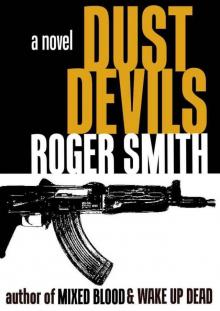 Dust Devils
Dust Devils![[2013] Sacrifices Read online](http://i1.bookreadfree.com/i/03/19/2013_sacrifices_preview.jpg) [2013] Sacrifices
[2013] Sacrifices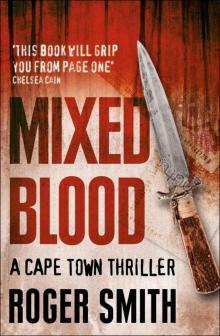 Mixed Blood
Mixed Blood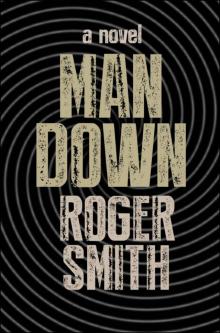 Man Down
Man Down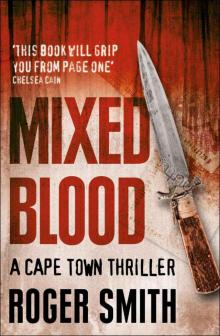 Mixed Blood ct-1
Mixed Blood ct-1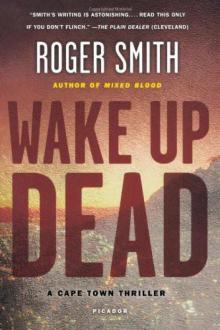 Wake Up Dead: A Thriller (Cape Town Thrillers)
Wake Up Dead: A Thriller (Cape Town Thrillers)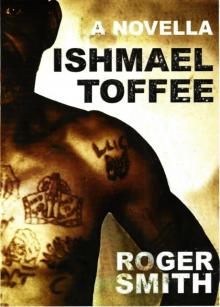 Ishmael Toffee
Ishmael Toffee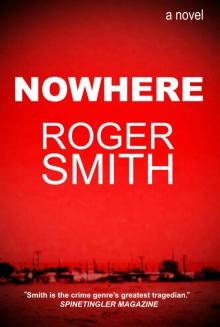 Nowhere
Nowhere Sacrifices
Sacrifices